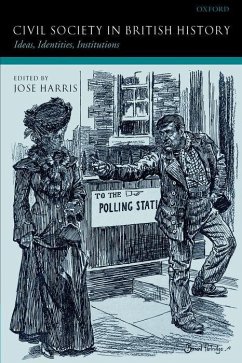This book explores the many different strands in the language of civil society from the sixteenth to the twentieth centuries. Through a series of case-studies it investigates the applicability of the term to a wide range of historical settings. These include 'state interference', voluntary associations, economic decision-making, social and economic planning, the 'bourgeois public sphere', civil society in wartime, the 'inclusion' and 'exclusion' of women, and relations between the state, the voluntary sector, and individual citizens. The contributors suggest that the sharp distinction between civil society and the state, common in much continental thought, was of only limited application in a British context. They show how past understandings of the term were often very different from (even in some respects the exact opposite of) those held today, arguing that it makes more sense to understand civil society as a phenomenon that varies between different cultures and periods, rather than a universally applicable set of principles and procedures.
Hinweis: Dieser Artikel kann nur an eine deutsche Lieferadresse ausgeliefert werden.
Hinweis: Dieser Artikel kann nur an eine deutsche Lieferadresse ausgeliefert werden.








